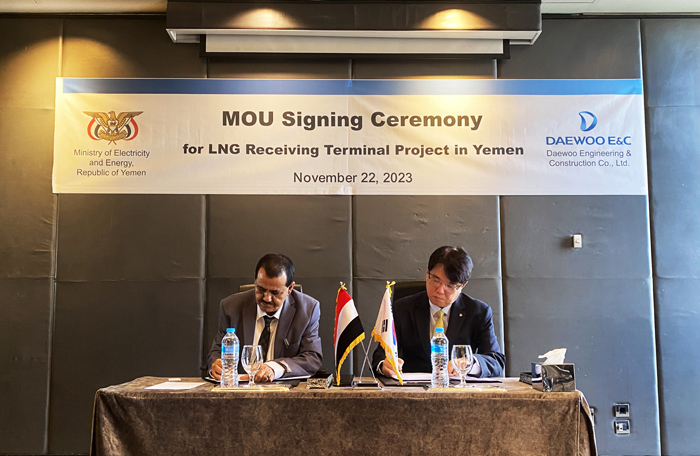South Korea’s Daewoo Engineering & Construction signed a memorandum of understanding with Yemen’s Ministry of Electricity and Energy to build a liquefied natural gas (LNG) receiving terminal in Yemen.
According to a statement by Daewoo E&C, the company’s chairman Jung Won-ju attented the signing ceremony with the ministry on November 22 in Kairo, Egypt.
Under the MoU, Daewoo E&C would build the LNG import terminal and a connecting pipeline to supply gas to the Little Aden power plant.
In addition, the two parties agreed to cooperate on additional energy infrastructure projects, including the construction of a 450 MW combined cycle power plant as Yemen looks to meet power shortage, Daewoo E&C said.
The firm said that Yemen is in need of an LNG import terminal and a gas-powered power plant as the cost of electricity production at diesel-fueled power plants is increasing due to high oil prices.
Following the signing of the MoU, Daewoo E&C said it will continue to hold discussions with the Yemeni ministry and conduct surveys.
The firm noted that there are currently geopolitical uncertainties in Yemen but the MoU provides a foundation for quickly advancing the project when these are resolved in the future.
Daewoo E&C noted it has experience building LNG plants in Algeria, Papua New Guinea, Russia, and Indonesia and it is currently working on a $4 billion contract for Nigeria LNG’s seventh production unit at the latter’s Bonny Island plant.
Yemen already has the LNG export plant in Balhaf with a capacity of about 6.7 mtpa, but the facility remains shut since 2015 due to the security and political situation at both the national and local levels, France’s TotalEnergies previously said.
The LNG terminal’s shareholders are TotalEnergies with a 39.6 percent interest and US-based Hunt Oil with a 17.2 percent interest. South Korea’s SK Innovation, Hyundai and Kogas have a combined 21.4 percent interest, and Yemen’s state-owned YGC and state organization GASSP have a combined 21.7 percent interest in the plant.

